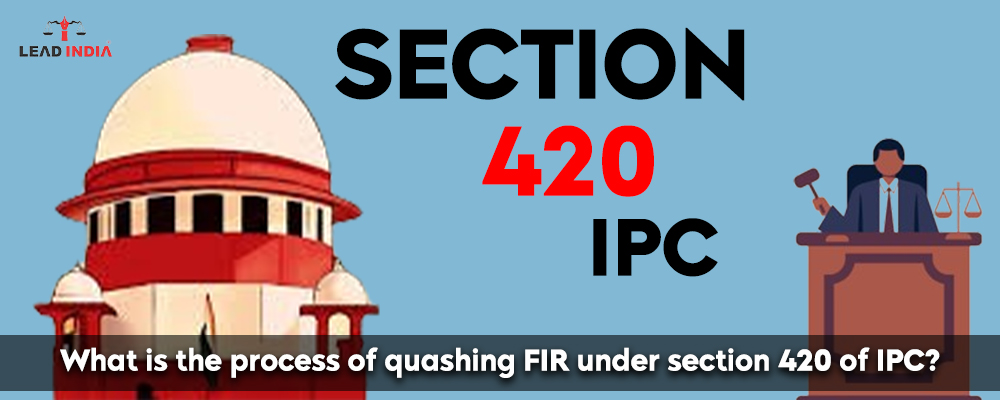Section 420 IPC is a serious form of cheating that includes inducement (leading or moving someone to do something) in the form of the delivery of property or valuable securities. This section also applies to cases in which property is destroyed as a result of fraud or inducement. This section provides for punishment for cheating, which can last up to seven years and includes a fine. But as per new law The BNS 2023 whoever cheats shall be punished with imprisonment of three yers or fine or both.
Need A Legal Advice
The internet is not a lawyer and neither are you. Talk to a real lawyer about your legal issue

A person’s intention is both a necessary and significant component of committing a crime. To establish the offense under Section 420, the person’s intention to cheat must have been present from the start. The failure to fulfill a promise on time does not imply dishonest intent. Deception is the second necessary component for committing a cheating offense. Deception is the process of concealing the truth. It must be demonstrated that the person making the promise was dishonest at the time of making it. But as per new law The BNS 2023 whoever cheats with the knowledge that he’s going to harm the other person by causing wrongful loss to them may imprinsoment upto 5 years or with fine or both. As well whoever cheats and dishonstly induces the person to deliver any property to any peron or make , alter, or destroy the whole amount to be punished with imprisonment of either seven year and shall also be liable to fine.
Quashing of FIR under section 420
To quash an FIR under Section 420 of the Indian Penal Code (IPC), there must be evidence of a dishonest inducement to deceive a person into delivering property to another individual. The Supreme Court has emphasized that an offense under Section 420 IPC must involve a clear dishonest inducement.
The High Court may exercise its powers under Section 482 of the Criminal Procedure Code to quash criminal proceedings if there is a settlement between parties in civil cases or where the wrong is primarily between the victim and the offender and they have resolved their disputes amicably. To successfully quash an FIR under Section 420 IPC, it is critical to establish the presence or absence of dishonest inducement and consider settlements reached between parties in certain circumstances.
What is the process of quashing FIR under section 420 of IPC?
- To file a quashing petition, submit it to the appropriate court, typically the High Court. The petition should clearly state the reasons for seeking the quashing of the FIR under Section 420 IPC.
- The petition should include grounds for quashing, such as insufficient legal evidence or failure to disclose a cognizable offense. It is critical to demonstrate that the allegations do not constitute the alleged offense, particularly in cases of dishonest inducement in cheating under Section 420 IPC.
- It is recommended that you seek legal representation to ensure that the petition is properly drafted and presents a strong case for quashing the FIR under Section 420 IPC.
- The High Court will evaluate the petition and determine if quashing criminal proceedings is necessary to prevent abuse of the legal system and ensure justice. The court will consider the allegations in the FIR to see if they meet the necessary elements for an offense under Section 420 IPC.
- The power under Section 482 of the Criminal Procedure Code is discretionary, and the court may refuse to quash proceedings if it finds merit in pursuing the case.
Individuals who follow these steps and present a compelling case supported by legal arguments can file a petition for quashing an FIR under Section 420 IPC and seek relief from unjust or improper legal proceedings.
Case Law:
Rekha Jain v. The State of Karnataka and Ors., 2022
The co-accused, Rekha Jain, is not even accused of deceiving through enticement and delivering the gold jewelry. Her husband, Kamalesh Mulchand Jain, has been accused of fraudulent enticement and cheating. As a result, it cannot be argued that Rekha Jain committed any offense under Section 420 of the IPC for which she is currently charged, given the charges in the FIR and the absence of any allegation of dishonest inducement against her. As a result, the High Court committed a serious error in refusing to discontinue the criminal prosecution against Rekha Jain for the offense mentioned in Section 420 of the IPC. In this case, the High Court may have exercised its authority under Section 482 of the CrPC to halt Rekha Jain’s prosecution for the offense mentioned in Section 420 of the IPC. The criminal case against Rekha Jain, the appellant and accused, for violating Section 420 of the IPC, has now been dismissed. The appeal was partially allowed.
It is advisable to consult a lawyer for filing a petition for quashing an FIR under section 420 IPC. Lead India offers various legal services, including free legal advice and online information. You can talk to a lawyer and ask a legal question on various matters through our platform





 Talk to a Lawyer
Talk to a Lawyer